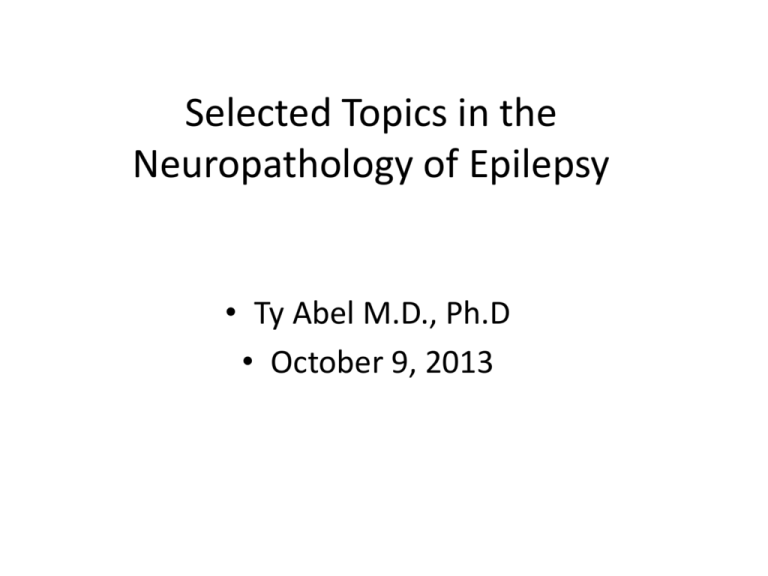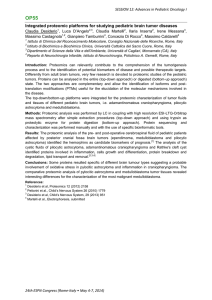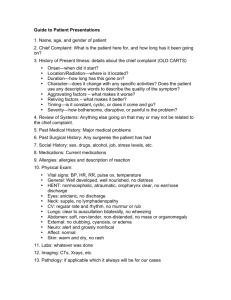Document
advertisement

Selected Topics in the Neuropathology of Epilepsy • Ty Abel M.D., Ph.D • October 9, 2013 Epilepsy • "an episodic disorder of the nervous system arising from the excessively synchronous and sustained discharge of a group of nerve cells" Hughlings Jackson, 1873 Epilepsy-Classification • Primary: epilepsy that occurs in the absence of other syndromes or disorders. Presumed to have a genetic basis e.g., Benign Neonatal Familial Convulsions, Juvenile Myoclonic Epilepsy • Secondary: a primary pathology exists independent from the epilepsy e.g., trauma, infection, neoplasm etc Secondary Epilepsy • • • • • • Trauma Vascular malformations Cerebral malformations Rasmussen's Syndrome Mesial Temporal Sclerosis Neoplasms Epilepsy-General Concepts • Cortical lesions (often temporal) more likely to produce seizures than deep-seated lesions • If cause is neoplasm, most likely a welldifferentiated one • Radiographic features can aid in the differential diagnosis • e.g., Focal vs Diffuse Trauma • Incidence of epilepsy > with penetrating injuries • Incidence higher with injury to parietal, motor areas • Disrupted function due to scar? Blood or blood products in neuropil? Vascular Malformations • Cavernous Angioma • Arterio-venous malformation • Sturge-Weber Syndrome Cavernous Angioma Burger et al., Surgical Pathology of the Nervous System and its Coverings, 4th Ed, 2002 Cavernous Angioma Arteriovenous Malformation Burger et al., Surgical Pathology of the Nervous System and its Coverings, 4th Ed, 2002 Arteriovenous Malformation Burger et al., Surgical Pathology of the Nervous System and its Coverings, 4th Ed, 2002 Sturge-Weber Syndrome • Vascular malformations of the face, eye and brain • Proliferation of leptomeningeal vessels and laminar cortical calcification • Associated with ipsilateral port-wine stain in distribution of facial nerve, glaucoma, cerebral atrophy, mental retardation and seizures • Considered a non-heriditary, developmental malformation cause by somatic mutation in the GNAQ gene. Sturge-Weber Disease Burger et al., Surgical Pathology of the Nervous System and its Coverings, 4th Ed, 2002 Sturge-Weber syndrome Burger et al., Surgical Pathology of the Nervous System and its Coverings, 4th Ed, 2002 Cerebral Malformations • Cortical Dysplasia • Hemimegalencephaly Cortical Dysplasia • Cause of chronic seizures in both children and adults • Thickened cortex and blurred gray-white junction sometimes seen radiographically • Microscopic: effacement of laminar cortical architecture with extremely large neurons, astrocytes and intermediate ballooned forms Cortical Dysplasia Burger et al., Surgical Pathology of the Nervous System and its Coverings, 4th Ed, 2002 Cortical Dysplasia Burger et al., Surgical Pathology of the Nervous System and its Coverings, 4th Ed, 2002 Hemimegalencephaly • Enlargement of one cerebral hemisphere associated with intractable seizures • May lead to hemispherectomy • Pathologically, can be associated with diffuse form of cortical dysplasia, gyral malformations and heterotopias Hemimegalencephaly Burger et al., Surgical Pathology of the Nervous System and its Coverings, 4th Ed, 2002 Hemimegalencephaly Rasmussen's Syndrome • Abrupt childhood onset of seizures with progressive unilateral neurological deficit • Refractory to anticonvulsants • Etiology unknown-viral?, autoimmune? • Inflammatory process restricted to one hemisphere • Atrophy, leptomeningeal lymphocytes, perivascular cuffing, microglial nodules, neuronophagia Rasmussen's Syndrome Rasmussen's Syndrome Rasmussen's Syndrome Rasmussen's Syndrome Mesial Temporal Sclerosis • Complex partial seizures • Cause or effect of seizures or both? • Association with prolonged initial seizure in childhood or recurrent febrile convulsions • Loss of neurons in Ammon's horn, esp. CA1 • Dentate granule cell dispersion • Chaslin's subpial gliosis Chronic Temporal Lobe Epilepsy Hippocampus Normal Mesial Temporal Sclerosis Hypothalamic Hamartoma • Gelastic seizures • Precocious puberty • Other endocrine abnormality (e.g., acromegaly) Hypothalamic Hamartoma Hypothalamic Hamartoma Neoplasms • • • • Pilocytic Astrocytoma Pleomorphic Xanthroastrocytoma (PXA) Ganglion Cell Tumors Dysembryoplastic Neuroepithelial Tumor Low-grade Neoplasms-Radiographic features Ganglioglioma Pilocytic Astrocytoma Other features: superficial location, skull erosion and calcification Burger et al., Surgical Pathology of the Nervous System and its Coverings, 4th Ed, 2002 Juvenile Pilocytic Astrocytoma • • • • • • Most common childhood glioma 10% of cerebral and 85% of cerebellar astrocytomas Classic Radiologic Features Classic Histology albeit diverse “looks” Classic Association with NF1 New Association with alterations in BRAF Peter Burger: Surgical Pathology of the Nervous System and its Coverings Pilocytic Astrocytoma and the Ras Pathway EGF/PDGF plasma membrane P P GRB2 GEF GAP Neurofibromin ras-GDP ras-GTP Raf MEK 1/2 P P MEK 1/2 Erk 1/2 Ets Elk-1 c-fos c/n-myc stat 1/3 RAF fusion protein results in constitutively active pathway in sporadic PA Erk 1/2 cytoplasm nucleus Pilocytic Astrocytoma Intra-operative Smear Preparation Pilocytic Astrocytoma: H&E PA: Rosenthal fibers and EGBs Pilocytic Astrocytoma: Immunohistochemistry GFAP MIB-1 Pilomyxoid Astrocytoma: Often no Telltale Radiographic Features Pilomyxoid Astrocytoma Pilomyxoid Astrocytoma Pilomyxoid Astrocytoma Pilomyxoid Astrocytoma Neurofilament Neurofilament for Axons MIB-1 GFAP Pilomyxoid: Summary • No pathognomonic clinical or radiologic characteristics (age?) • Perivascular tumor cells, myxoid change, cellular monomorphism • Should be the predominant pattern • Propensity for recurrence, leptomeningeal spread. Pleomorphic Xanthroastrocytoma Pleomorphic Xanthroastrocytoma GFAP Immunohistochemistry Gangliocytoma Ganglioglioma Ganglioglioma Synaptophysin Immunohistochemistry Dysembryoplastic Neuroepithelial Tumor Dysembryoplastic Neuroepithelial Tumor Dysembryoplastic Neuroepithelial Tumor H&E Alcian Blue Stain Dysembryoplastic Neuroepithelial Tumor Case study: 12-year-old female • “Syncopal” episodes for last 9 months • Observed to have seizure in school • CT scan was obtained on the outside – Outside CT shows heterogeneous, solid and cystic, left occipital lobe mass • Patient underwent craniotomy on 11/15/2005 Neuro-imaging Histopathology: H&E Histopathology: H&E Histopathology: H&E NF MIB-1 Chromogranin GFAP MIB-1 Diagnosis? Ganglioglioma, WHO Grade I Follow-up • Resolution of seizures • Resolution of post-op surgical changes on surveillance MRI • Last seen in clinic on 11/14/2012, without deficits. ???????? Or Comments





